Innovations Catalyzing Growth in Kenya's Potato Sector
The International Day of the Potato, celebrated on May 30th, highlights the global significance of this vital crop. This day highlights ongoing efforts and innovations to overcome challenges and enhance the productivity and sustainability of Kenya's potato sector. This year's celebrations, held at the Kenya Agricultural and Livestock Research Organization (KALRO) in Oljororok, Nyandarua County, centered around the theme "Harvesting Diversity; Feeding Hope." The Agricultural team sponsored the booths of some of the Dutch companies active in the potato sector.
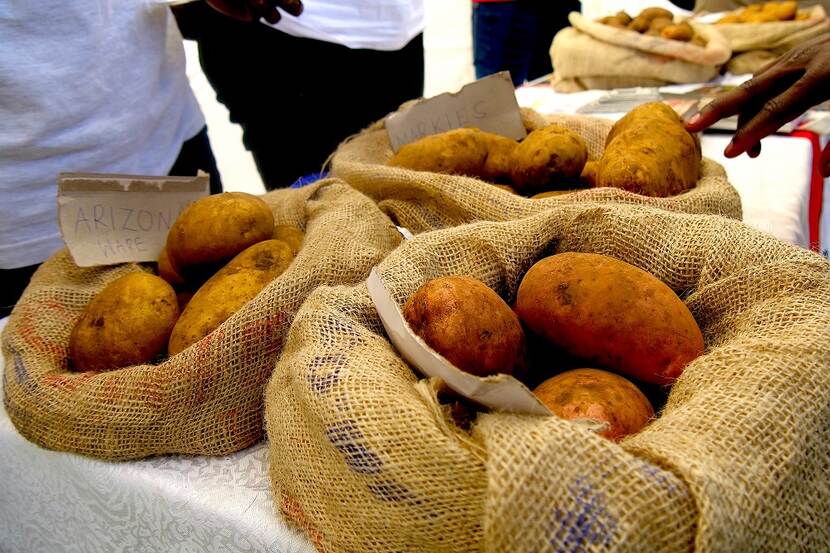
In Kenya, the potato is not just a dietary staple but a critical economic driver, particularly for smallholder farmers, who account for 80% of producers in the Agriculture sector. Potatoes are the second most important food crop in Kenya after maize. The subsector plays a crucial role in food and nutrition security, providing essential nutrients and income to millions of people. Potato versatility makes it ideal for growing in diverse agro-ecological zones across Kenya.
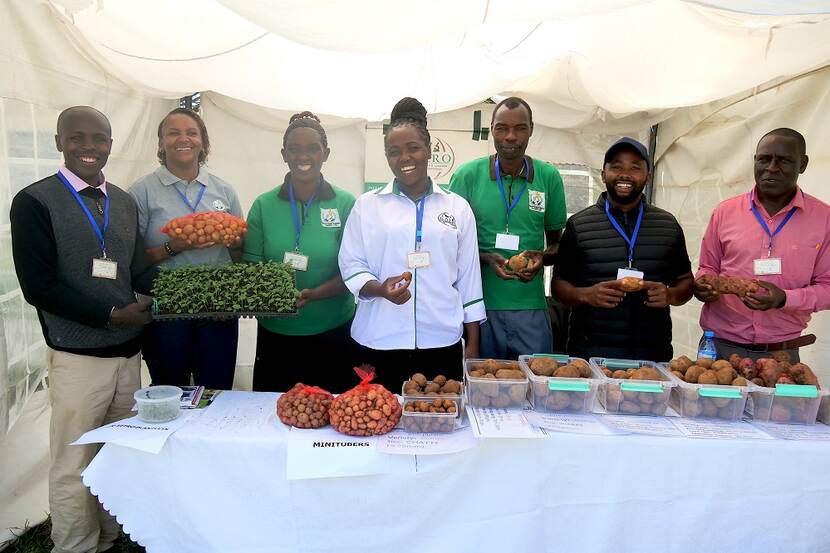
The objectives of celebrations organized by KALRO included raising awareness about the potato's nutritional, economic, and cultural significance, promoting sustainable farming practices and technologies for resilience, facilitating knowledge exchange and collaboration within the value chain, and showcasing innovative initiatives contributing to sustainable development goals.
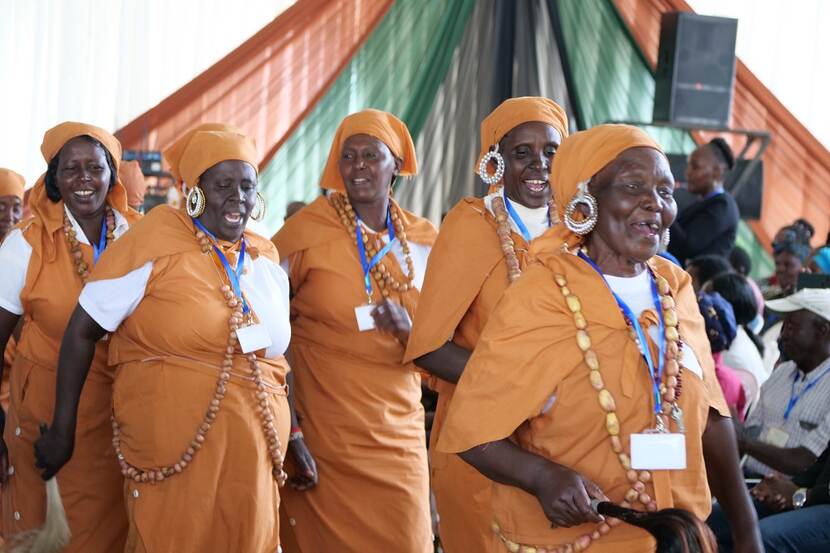
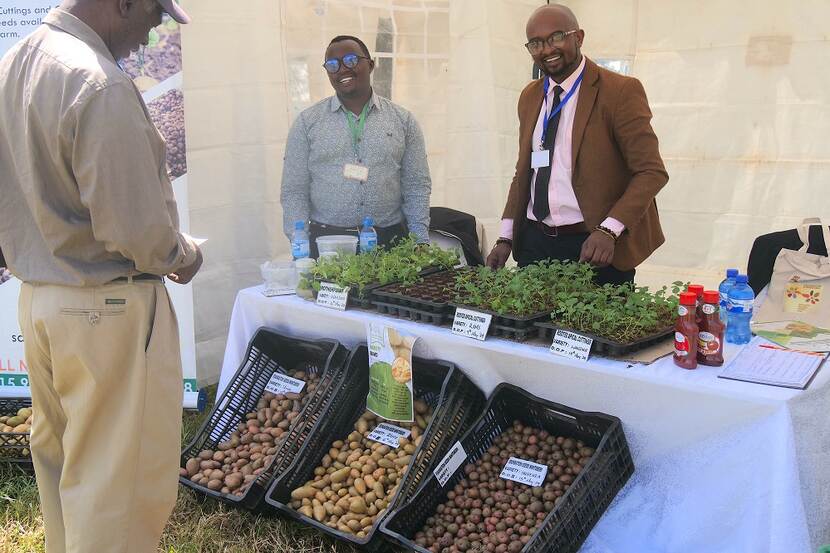
Despite its significance, the potato sector in Kenya faces substantial challenges, including low yields, with farmers often achieving just 10 tons per hectare compared to potential yields of up to 70 tons in the Netherlands. This is occasioned by multiple factors;
- inadequate seed quality, as the lack of certified seed potatoes leads to the widespread use of inferior seeds that hamper crop quality and yield
- post-harvest losses due to poor storage facilities and handling practices that significantly reduce the volume and quality of marketable potatoes
- regulatory bottlenecks, occasioned by the long period required for seed certification process.
Speaking during the celebrations, Elizabeth Kiamba (Agriculture Advisor, Embassy of the Kingdom of the Netherlands), noted the drastic transformation of the landscape of seed breeding in Kenya.
“Partnerships, particularly with the Netherlands, have catalyzed this change. Since 2013, the number of registered potato varieties has surged from 13 to 64, with 34 varieties from the Netherlands.“ – Elizabeth Kiamba, Agricultural Advisor (Embassy of the Netherlands Nairobi)
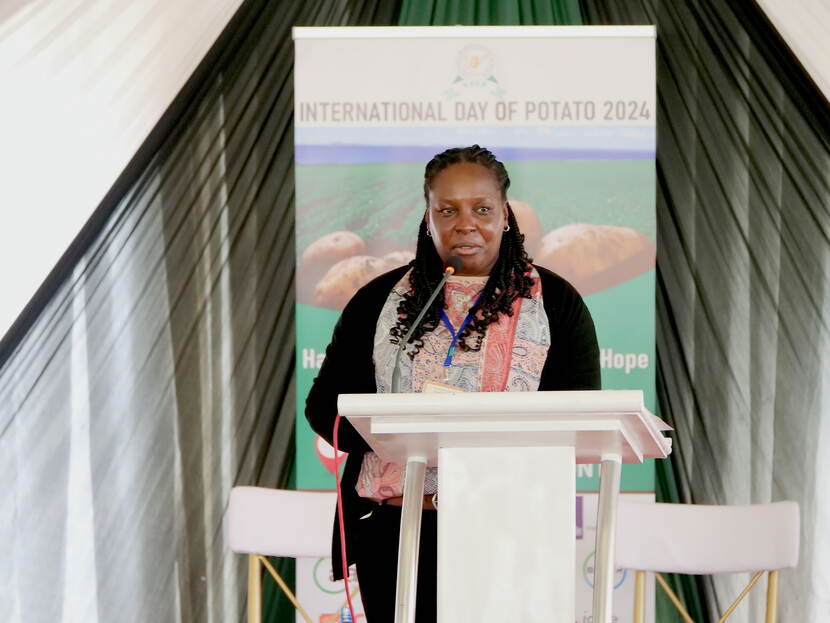
These varieties offer superior yields and resistance to diseases, making them ideal for both local consumption and processing. Their adoption has not only improved the quantity and quality of potatoes but also invigorated the processing sector, providing new market opportunities and enhancing the economic prospects of farmers.
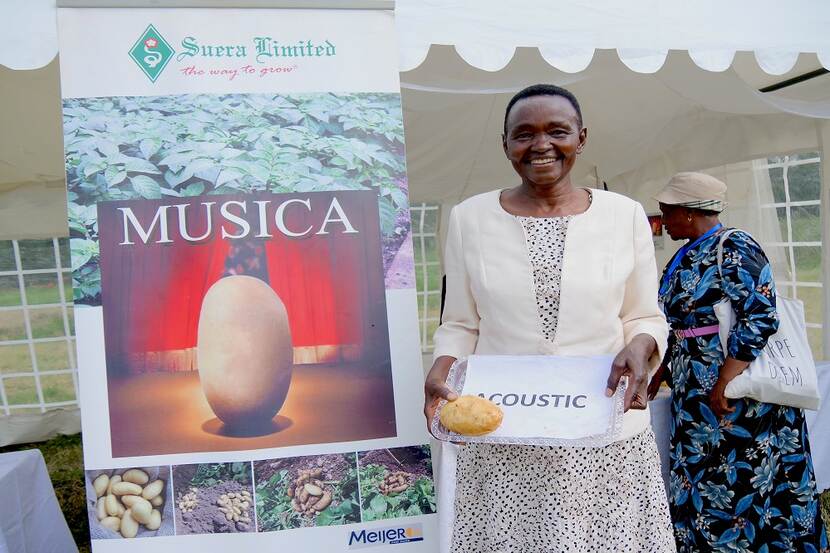
One of the recent breakthroughs in yield productivity per acre has been piloted by Suera Limited, that has been able to produce 70 tons in an acre. This goes to show, that these targets are achievable and the resulting impact from these yields, is better returns for the farmers and contribution to food and nutrition security.
Dr. Paul Demo, Senior Principal Scientist at the International Potato Center (CIP), highlighted that significant strides have been made in the production and distribution of certified seed potatoes. Technologies such as apical cuttings and true potato seed are revolutionizing seed production efficiency. Collaborative efforts with CIP and other breeders have established seed multiplication businesses and provided extensive training to farmers, ensuring a consistent supply of high-quality seeds.
Farmers had the opportunity to interact with Solynta, a Dutch company introducing true potato seed, that allows direct soil planting. Steven Kamau, Agronomist at Solynta, emphasized that the introduction of true potato seed is a game changer for Kenya’s potato subsector. This prevents the transfer of pests and diseases between farms since farmers plant seeds instead of vegetative planting material. Additionally, traditional potato seeds are bulky and increase input costs, whereas Solynta’s seeds are packaged in grams, making them more cost-efficient for farmers to transport.
Solynta
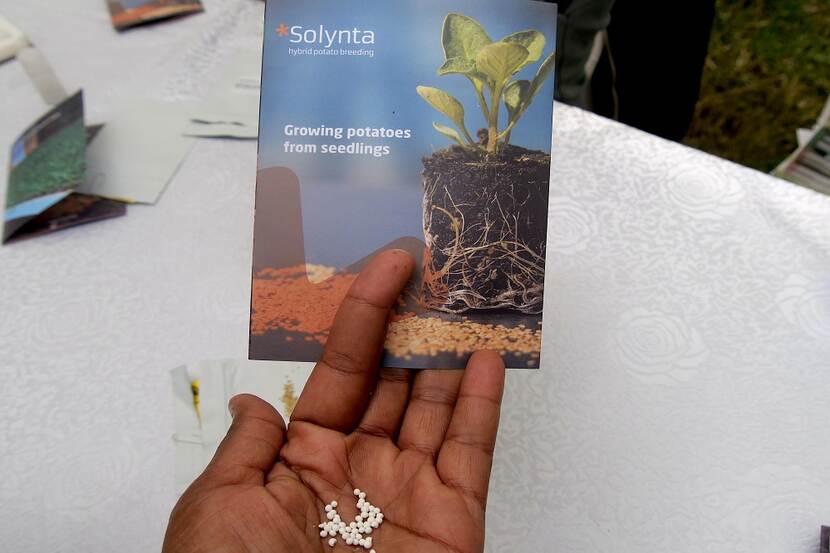
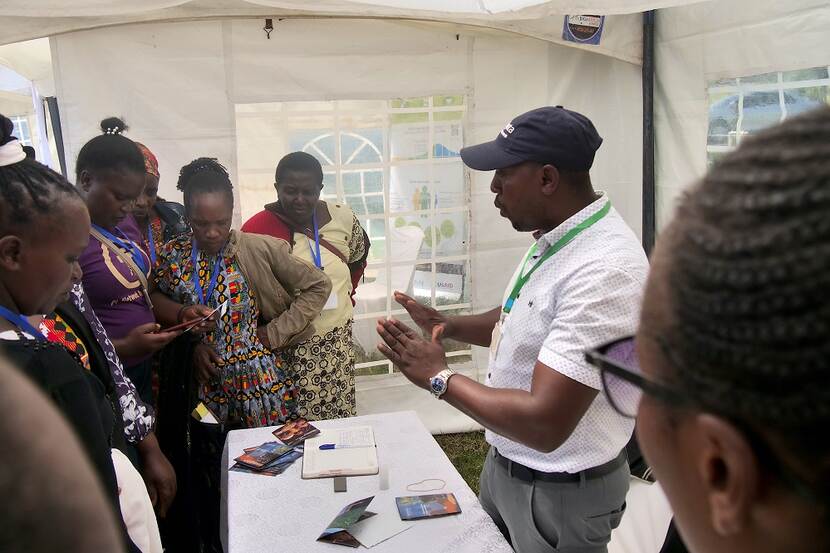
Beyond boosting production, innovative storage solutions are essential for reducing post-harvest losses and maintaining the high quality of Kenyan potatoes. Cold storage units and advanced storage techniques enable farmers to extend the shelf life of their produce, reducing spoilage, and ensuring a steady supply throughout the year while capitalizing on high-demand periods for optimal returns.
Hanse Agrostore from the Netherlands showcased innovative modular warehouses that do not require power, making them ideal for farmers of all scales. This flexibility allows small-scale and large-scale farmers alike to benefit from improved storage solutions, significantly reducing post-harvest losses and improving profitability.
Hanse Agrostore
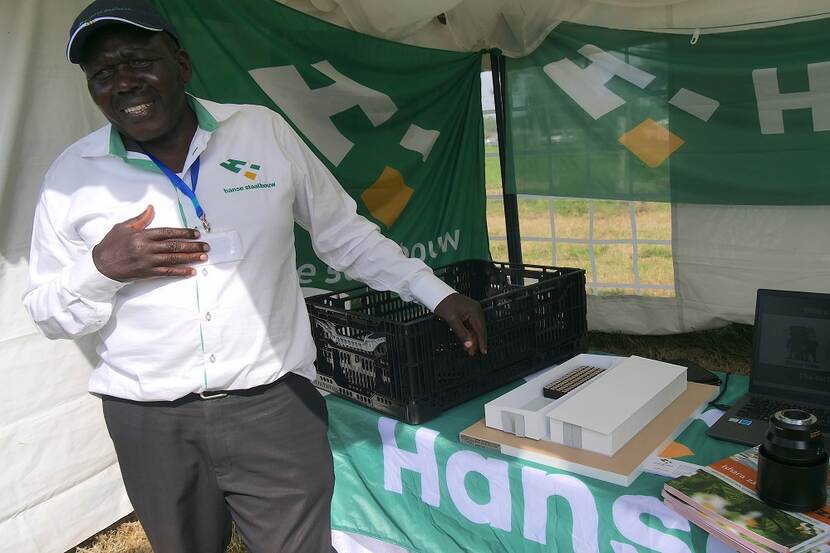
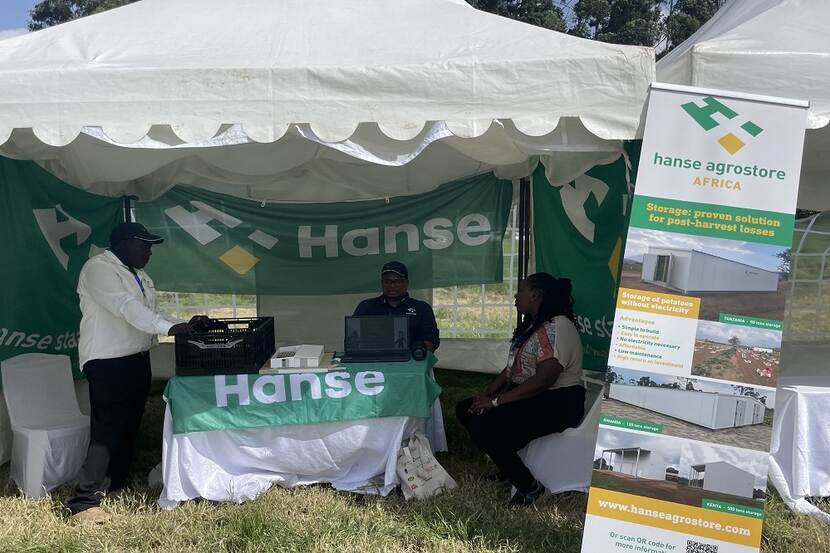
Verde Technologies/Tolsma Grisnich BV have been pioneers in this field, introducing state-of-the-art seed potato storage solutions in Kenya. These cutting-edge facilities extend the dormancy period for both seed and ware potatoes, enhancing their viability and quality.
Another Dutch companies showcasing was Kevian Kenya Group. They established a potato project, which entailed establishing a tissue culture lab. They source certified Invitros from KEPHIS Muguga and carry out multiplication at their Tissue Culture lab located at Hanna Roses (part of Kevian Group).
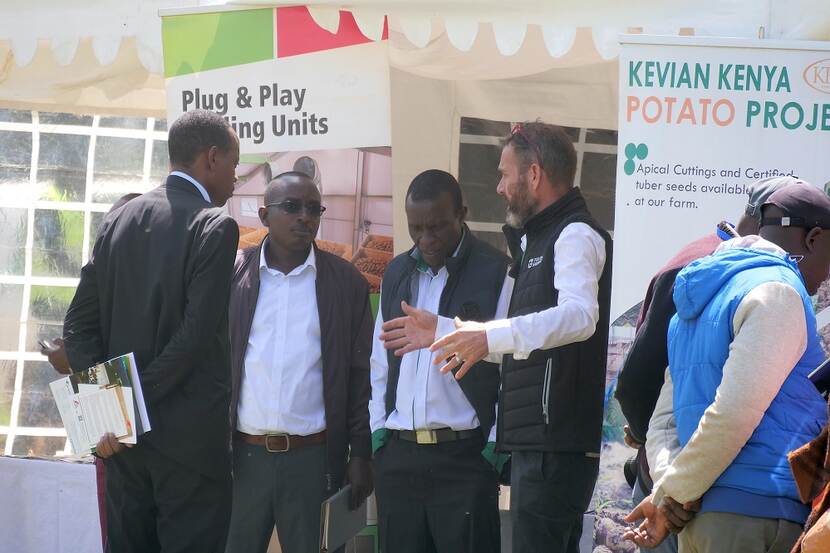
Hon. John Mathara (Deputy governor, Nyandarua county) commended the National Potato Council of Kenya (NPCK) but challenged the extent to which this cash crop can increase impact for the farmers. He added that, for these innovations and efforts towards positioning the potato sector to work, there is a need for stakeholders to collaborate, especially on the implementation of already gazetted regulations and not just about value addition.
“The regulations not only address critical challenges but also enhance productivity and create new economic opportunities for all value chain actors. Sustained investment and international collaborations are key to increasing this momentum and fully unlocking the potential of Kenya's potato sector.” - Hon. John Mathara (Deputy governor, Nyandarua county)
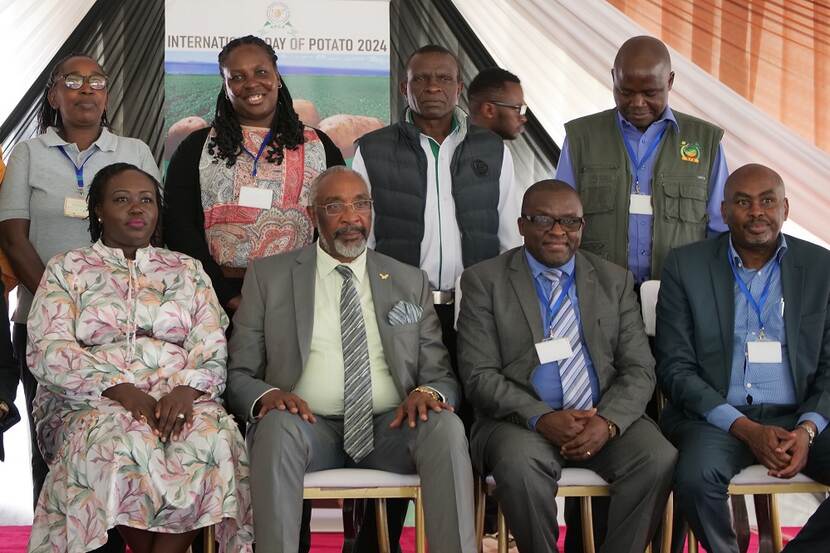
For more information about this sector or any other agricultural questions feel free to contact us via nai-lnv@minbuza.nl. For the latest updates on activities, new articles and more follow us on X (Twitter) on @NLAgiKenya and subscribe to our newsletter by sending us an email. In case of any non-agriculture questions for the Netherlands Embassy in Nairobi, see this website for contact information
More information:
- Potato Variety Catalogue (NPCK) 2021: npck.org/wp-content/uploads/2021/10/NPCK-2021-CATALOGUE-17.pdf
- From plant to plate: Kenya-Netherlands cooperation in the potato sector
- Working together on sustainable potato production in Kenya
- Factsheet on the potato sector | Kenia | Agroberichten Buitenland
- Solynta’s hybrid true potato seed varieties approved for commercial release in Kenya - Solynta